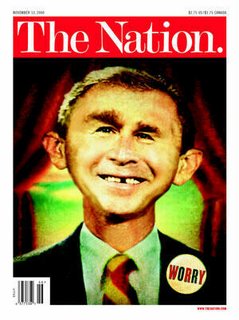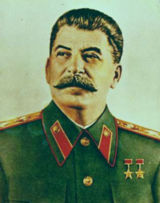 When I listen to George W. Bush speak I’m amazed that he can string several words together. The guy comes across as an absolute dolt. His often incoherent and ridiculous comments have boosted the careers of such comedians as Jon Stewart and Stephen Colbert. I’m sure his advisors cringe whenever he steps in front of a microphone, wondering what unimaginable absurdity will spew forth next.
When I listen to George W. Bush speak I’m amazed that he can string several words together. The guy comes across as an absolute dolt. His often incoherent and ridiculous comments have boosted the careers of such comedians as Jon Stewart and Stephen Colbert. I’m sure his advisors cringe whenever he steps in front of a microphone, wondering what unimaginable absurdity will spew forth next. The lights are on, as they say, but there's nobody home. But quite obviously there's more to the Bush Administration than just Dubya.
Indeed, Bush is a puppet president if there ever was one. He is not so much a leader as he is a preposterous figurehead who is both sympathetic to and easily manipulated by corporatists and the religious right.
And it’s not just Bush – his entire administration seems as ineffective and reckless as he his. VP Dick Cheney, National Security Advisor Condoleeza Rice and former Secretary of Defense Donald Rumsfeld have muddled their way through their terms and created innumerable problems overseas.
Of course, it hasn’t always been like this in the United States. It seems like ages ago now that Bill Clinton, an Oxford Rhodes Scholar, was at the helm of the executive office. And during the 1980’s, while he may not have been the sharpest or best of presidents, Ronald Reagan was the Great Communicator who had a coherent vision for America.
These days California can boast such leaders as Arnold Schwarzenegger...
Despite the dumbing down of U.S. politics and politicians (a phenomenon that’s hardly the domain of the U.S. -– as witnessed here in Canada recently with the rise in power of conservative leader Stephen Harper) and the anti-intellectualism that runs frustratingly rampant in North America, there have been many first-rate precedents for cerebral presidents.
 Thomas Jefferson, perhaps the most intellectual U.S. president ever, was Enlightened and pro-science. Abraham Lincoln and Theodore Roosevelt were no slouches either. Jimmy Carter used to correspond and debate with the late evolutionary biologist Stephen J. Gould (could you imagine Dubya trying to debate a scientist like Richard Dawkins – the mind boggles just thinking about it).
Thomas Jefferson, perhaps the most intellectual U.S. president ever, was Enlightened and pro-science. Abraham Lincoln and Theodore Roosevelt were no slouches either. Jimmy Carter used to correspond and debate with the late evolutionary biologist Stephen J. Gould (could you imagine Dubya trying to debate a scientist like Richard Dawkins – the mind boggles just thinking about it).The situation today with Bush and his corporate puppet masters reminds me of what happened in the Soviet Union after the death of Josef Stalin. It’s a phenomenon that has been referred to as the Law of Diminishing Dictators where each successive leader becomes more useless and ineffective than the last. Puppet masters need puppets without brains or political skill, otherwise they're difficult to control.
 Stalin was a very capable and conniving leader. He was skilled, savvy and brutal enough to lead the Soviet Union through a devastating world war and see his country become a world power. He terrorized his citizenry and terrorized his Politburo even more. He was notorious for his many internal purges to eliminate any potential rivals, giving Hitler the inspiration to do likewise. Needless to say, there was a massive sigh of relief among the Politburo members after Stalin’s passing.
Stalin was a very capable and conniving leader. He was skilled, savvy and brutal enough to lead the Soviet Union through a devastating world war and see his country become a world power. He terrorized his citizenry and terrorized his Politburo even more. He was notorious for his many internal purges to eliminate any potential rivals, giving Hitler the inspiration to do likewise. Needless to say, there was a massive sigh of relief among the Politburo members after Stalin’s passing. Resolved to never allow such a powerful and charismatic leader to lead the Soviet Union ever again (i.e. fearing for their collective asses and the ongoing social brutality), the Politburo decided that Nikita Khrushchev, a barely literate peasant, would be a reasonable successor. As benign as he appeared to be, however, he proved to be a bit more unpredictable than expected as witnessed by his 'we will bury you’ shoe-pounding Cuban Missile Crisis tenure. He was eventually replaced by Leonid Brezhnev, who was yet another step down the evolutionary ladder. Brezhnev proved to be very good at two things and two things only: collecting cars and showing off his countless shiny medals.
 Just when the Soviets thought they had outdone themselves with their successive string of low-brow and ineffectual leaders, along comes Yuri Andropov. He was 70 years old when he took office, was in poor health, and died after only 13 months in power. Then came the coup de grace with Konstantin Chernenko, the 73 year old comatose General Secretary. In one infamous moment, Politburo member Viktor Grishin dragged the terminally ill Chernenko from his hospital bed to a ballot box to vote in the 1985 elections.
Just when the Soviets thought they had outdone themselves with their successive string of low-brow and ineffectual leaders, along comes Yuri Andropov. He was 70 years old when he took office, was in poor health, and died after only 13 months in power. Then came the coup de grace with Konstantin Chernenko, the 73 year old comatose General Secretary. In one infamous moment, Politburo member Viktor Grishin dragged the terminally ill Chernenko from his hospital bed to a ballot box to vote in the 1985 elections.By this point in Soviet history the liberal voices in the Politburo were powerful and motivated enough to bring in the reformer Mikhail Gorbachev, but it was already too little too late.
Thankfully, democracies typically alleviate these sorts of situations prior to the onset of economic and social collapse. That said, elections are often only as good as the quality of the individual voter. It's arguable that the largely anti-intellectual, poorly educated and often fickle North and South American voter is responsible for bringing in such statesmen as Bush, Harper and the populist leftist leaders that are now emerging in the southern hemisphere (although the situation in South America is much more complex than that and worthy of deeper and fairer analysis).
 But there is near-term hope on the horizon both in Canada and the United States. Both countries have Poindexter leaders in waiting: in Canada there is public intellectual Michael Ignatieff (the potential heir apparent to philosopher king Pierre Trudeau) and in the States there is Hillary Rodham Clinton, a graduate of Wellesley College and Yale Law School.
But there is near-term hope on the horizon both in Canada and the United States. Both countries have Poindexter leaders in waiting: in Canada there is public intellectual Michael Ignatieff (the potential heir apparent to philosopher king Pierre Trudeau) and in the States there is Hillary Rodham Clinton, a graduate of Wellesley College and Yale Law School.In the meantime, we shouldn't expect any groundbreaking or progressive social policies from leaders like George W. Bush, but at least we can keep watching the Daily Show and the Colbert Report for our comedy fix.

No comments:
Post a Comment